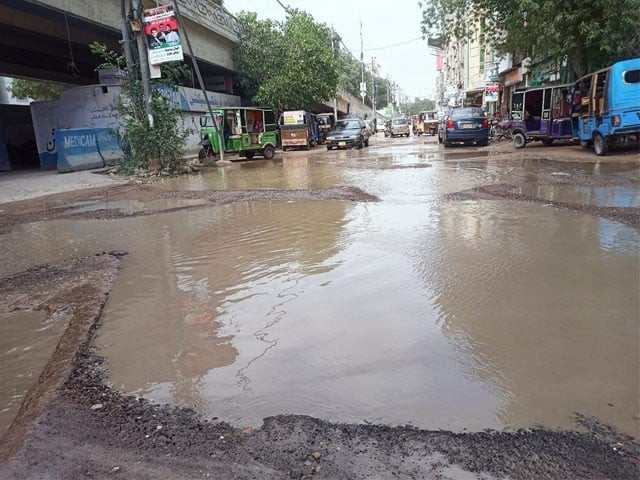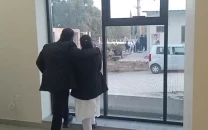Karachi survives another year in oblivion
Unaddressed water, transport, infrastructure issues have hindered city from reaching global standards of urbanisation

Unlike the past New Year's, the arrival of 2025 signifies the birth of the first cohort of Generation Beta babies, who are expected to grow in a new world increasingly dominated by artificial intelligence and technological innovations.
As fancy as this may sound, it is far from reality for the unfortunate child that will be opening their eyes this week in an average household in Karachi, where both the past, present and future appear to be hinged around the provision of basic urban necessities.
Water, transport and roads. Karachi's three incessant woes. Even as another year comes to an end, no major project initiated under the supervision of the federal or provincial government could reach its timely completion hence continuing the long-held tradition of sluggish development. While some projects were started as far as eight years ago and were halted midway, others faced delays in the initiation of key components thereby depriving the public of their intended benefits.
In the city of over 30 million people, only 650 million gallons of water are supplied daily from two sources, the Indus River and Hub Dam, which are insufficient to meet the city's daily water requirement of 1,200 million gallons. Despite the passing of two decades, no additional water has been sourced from the Indus River to address the deficit. Although two mega projects were launched in 2016 to overcome the water crisis, despite the passage of 8 years, they could not be completed.
The first was the K-IV project, which was supposed to supply 260 million gallons of water to Karachi. Despite consistent cost spikes, the project faced delays following which it was transferred from the Sindh government to the Water and Power Development Authority (WAPDA) in 2021. Under the new plan, the project should be completed by December 2025.
"So far, 50 percent of the work on the K-IV project has been completed. If the funds are released on time, the project will be completed soon," said an official from WAPDA.
However, sources have revealed that there are two more components of the K-IV project, the Augmentation Plan and the power station, which have still not been put into action. If both the components are not completed on time, it will not be possible to supply water to Karachi from Keenjhar Lake.
Similarly, the second water supply project was the 65 million gallons per day (MGD), which has been halted for five years due to the lack of interest of the Sindh government. Only 15 percent of the work on the project has been completed, even though the cost of the project has nearly doubled. The project has now been red-tapered at the government level and is being considered for construction on the basis of a public-private partnership.
When it comes to transport, the port city still faces a severe shortage of buses. Although 100 buses are running on the Green Line Phase I and Orange Line Bus Rapid Transit alongside 280 air-conditioned buses under the Peoples Bus Scheme, considering the population of the city, 8,000 more buses are still required.
According to a survey conducted by the Express Tribune, 400 public transport routes have been closed. Currently, only 135 routes are operational, through which 3,000 to 4,000 buses, minibuses and coaches are plying.
"Despite the passage of three years and an increase in cost, construction work on the Green Line Phase II has not been started," confirmed an officer from the Sindh Mass Transit Authority.
Conversely, an officer from the Sindh Infrastructure Development Company Limited assured that construction work on Phase II of the Green Line should be started in four months and will be completed in a year.
Furthermore, the Orange Line project, which is 3.9 kilometers long from Orangi Town Office to Matric Board Office, has been completed since two and a half years. However, very few passengers travel on this route since it is not connected to the Green Line.
Construction work on the Red Line bus project began in 2022. In 2024, construction was suspended for six months due to various reasons. Although the project was slated to be completed by 2025, it has now been postponed by another year. Similarly, the 26-kilometer-long Yellow Line project has also been postponed to 2027.
On the other hand, several roads including the MA Jinnah Road, New MA Jinnah Road, SM Taufiq Road, Shahrah-e-Pakistan, Rashid Minhas Road, Shahrah-e-Usman, Nishtar Road, Jail Road, Jamshed Road, Manghopir Road, Sher Shah Suri Road, Garden Road, Hub River Road, and Korangi Industrial Area Road are in disrepair. While similar issues plague the streets and other smaller lanes throughout the city.
A KMC official, speaking on the condition of anonymity, claimed that KMC has allocated Rs9 billion while the Sindh government has released Rs3.3 billion for district annual development for the current financial year.



















COMMENTS
Comments are moderated and generally will be posted if they are on-topic and not abusive.
For more information, please see our Comments FAQ